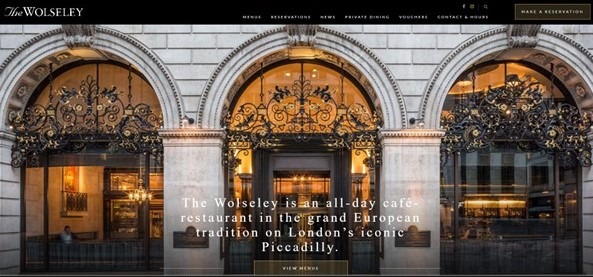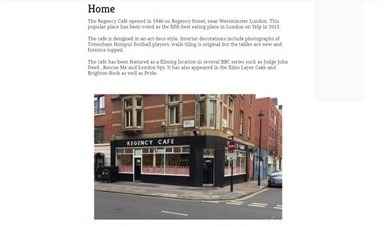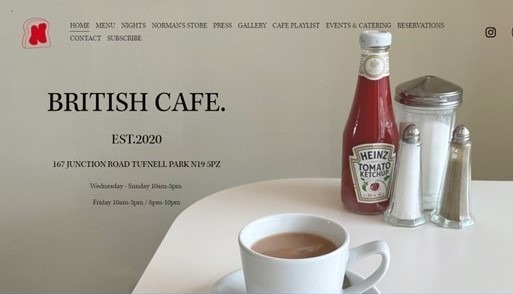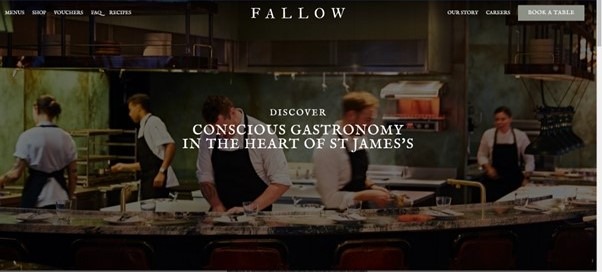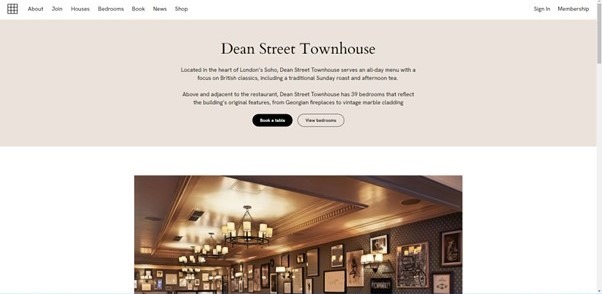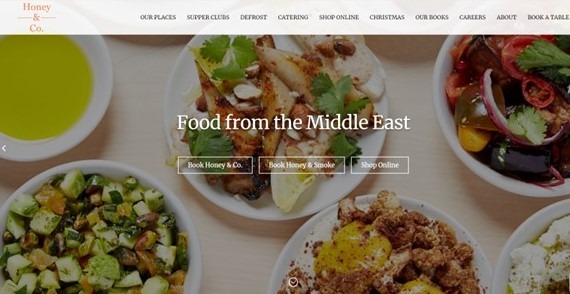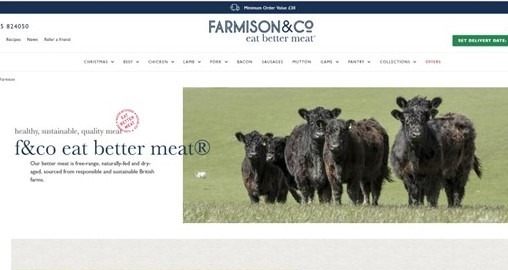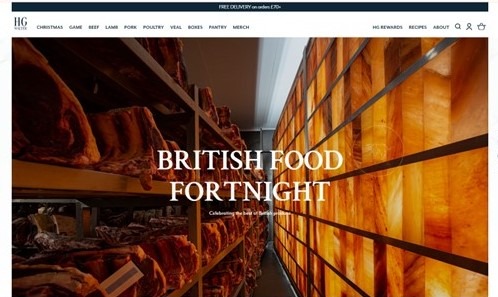The English Breakfast
The full English (aka the fry-up) is one of the glories of the British table. It’s rarely the subject of foodie musings though, certainly not amongst serious cooks and jobbing gourmands (baring Felicity Cloake’s cri de cœur Red Sauce Brown Sauce: A British Breakfast Odyssey). It feels slightly shameful even to raise its fat-flecked hominess, as if oeufs en meurette or fluffy okonomiyaki pancakes are somehow more appropriate topics for discussion. Both are more Instagram worthy, which may have something to do with it of course. But an English brekkie can be a marvellous affair and should be celebrated with all due flag waving and pageantry.
English breakfast is a misnomer, the Scottish version is equally good and I’ve eaten many a fine plate across the Irish sea (the north’s Ulster Fry is justly famous, and the south does a good spread, too). The scant few I have eaten in Wales didn’t seem significantly different to the English version (honestly, there’s no political sub-text here) baring the excellent quality of the produce. And nobody east of Abergavenny understands laverbread and cockles so we’ll pass over that in silence. Each country and indeed region has its own take on matters, additions and subtractions to the basic formula of eggy bacon-hood.
Naughty-postcard B&Bs, inner-city greasy spoons and condensation-befogged truckers’ cafes (never cafés) are its natural habitats, but it’s also served in the rather classier hotels and restaurants. Even the country-house set are not immune to its charms. They keep its working-class tendencies tightly under the lid of silver chaffing dishes, however, pretending people prefer kedgeree and kippers which, for the most part, they don’t.



For home cooking, source as good an egg as wherewithal allows – deep yellow yolkiness and the glow of happy-chicken karma awaits. Cook fried eggs swiftly on a medium-high heat for a petticoat of lacey crispness. A mix of oil and butter works best in terms of cooking temperature and taste. Spoon the hot fat over the yolk to ensure the ghastly jelly that surrounds it cooks without solidifying the yolk. Season at the table with sea salt flakes and a rasp of black pepper.
For scrambled eggs, I prefer the slow-cooked, regularly massaged and overly buttered approach. James Beard’s indulgent version, kindly reproduced by the NY Times, is exemplary. The cream is unnecessary though (it dilutes the egg too much) – just add more butter. A more robust, ribbony, scramble is produced by higher heat and less stirring. Please note, the fry-up isn’t the moment for poached-egg asceticism. Leave that to non-feast days and, even then, hide them under a blanket of hollandaise or transform them into Nigella’s fabulous Turkish Eggs.


A note regarding hotel/restaurant eggs – I’ve never eaten scramble in a commercial establishment that was anything less than upsetting. Even in very high-end affairs they are not given enough time, love or butter to approximate the home spun. The one exception is if your hotel has an “egg person”, that is a member of staff whose sole duty it is to create the eggs of your dreams fresh in front of you. The wonderful Mount Nelson hotel in Cape Town is one such place and their eggs are sublime. Otherwise avoid at all costs and have fried.
Good back bacon (from your butcher), smoked or not as the feeling takes you, is a must. No overly salted rashers, please, weeping copious, fatty tears as if conscious of their own mediocrity. Streaky is an option. We always had it on the boating holidays of my chilhood: streaky cooks fast which is a definite bonus when your kitchen consists solely of a Baby Belling and a kettle. And nothing smells as good as the waft of crisp, more-fat-than-flesh bacon across the Norfolk Broads of a morning. If you don’t have a quality butcher to hand, then very good pork products can be procured online. Quality butchers such as Farmison & Co and Pipers Farm offer swift ordering and delivery, as do top-notch regional butchers like The Ginger Pig and The Salt Pig.
Sausages can gild the porcine lily. I source mine from a local emporium in preference to supermarket slugs. You want plain pork from a good breed (Gloucester Old Spot and the like), outdoor reared and piggy friendly (well, as friendly as possible…). I have no idea who eats beef sausages, but they frighten me a little (both sausages and the people). You certainly don’t want to be sharing breakfast with them. And don’t get me started on the abomination of America’s chicken chipolatas. Of the widely available porky brands I head to Newmarket, a town famous only for sausages (and racing, I suppose). My family have been debating the relative merits of Powters and Musk's since the Civil War, but at last count Musk’s was a nose ahead at the final furlong. Avoid anything heavy-handed with the mace, sage or pepper – Lincolnshire, Oxford and the slightly alarming coil of a Cumberland have no place on the breakfast plate.
Proper black pudding – Bury or Stornoway are always good choices – is a fine addition if cooked crisp on the outside and softly yielding within. Conduct auditions to discover your favourite as recipes vary quite significantly from the overly fragrant to the frighteningly umami. Texture is important too – neither too liver pâté nor excessively oaten and rubbly. Producers like Charles Macleod and McCaskie's regularly win awards. The former is favoured by the London über-butchers HG Walter – a good sign.



Don’t be tempted down the morcilla or boudin route: what starts out with best intensions of elevating the national dish with European chic ends with something no Spaniard or indeed Brummie would recognise or applaud. Also don’t be tempted to make your own blood pudding (recipes and suppliers of “fresh ingredients” abound on the inter web). Unless you intend labouring over a steaming caldron like a Shakespearean crone, leave it to the experts. There is in fact a rather fine Macbeth's butcher, appropriately just down the road from Cawdor castle, selling their black (and white) puds online. They have done the cauldron work for you. White pudding is an interesting Celtic option, it’s more fragrant and lighter than the black variety but isn’t, to my mind, as good (probably why it hasn’t travelled). The Scots even have fruit pudding, but that’s a step too far down the woad-and-cairn path, I think.
One or other of mushrooms and tomatoes (not both: don’t be greedy) provides the “veg” to all this meatiness. I favour mushrooms cooked sufficiently beyond the stewed stage into butter-crusted warmth. Their deep savouriness works better with the other elements (the acidity of tomatoes can jar, especially with egg). It’s with a heavy heart that I cast aside tomatoes, though, if only because bread fried in their caramelised residue it a thing of real joy. Don’t even contemplate tinned tomatoes or those unloved, barely grilled halves – unless your name is Babs, you wear a house coat and work in a south-coast boarding house (in the 1950s). Apologies if this describes you. But really, pull yourself together Barbara.
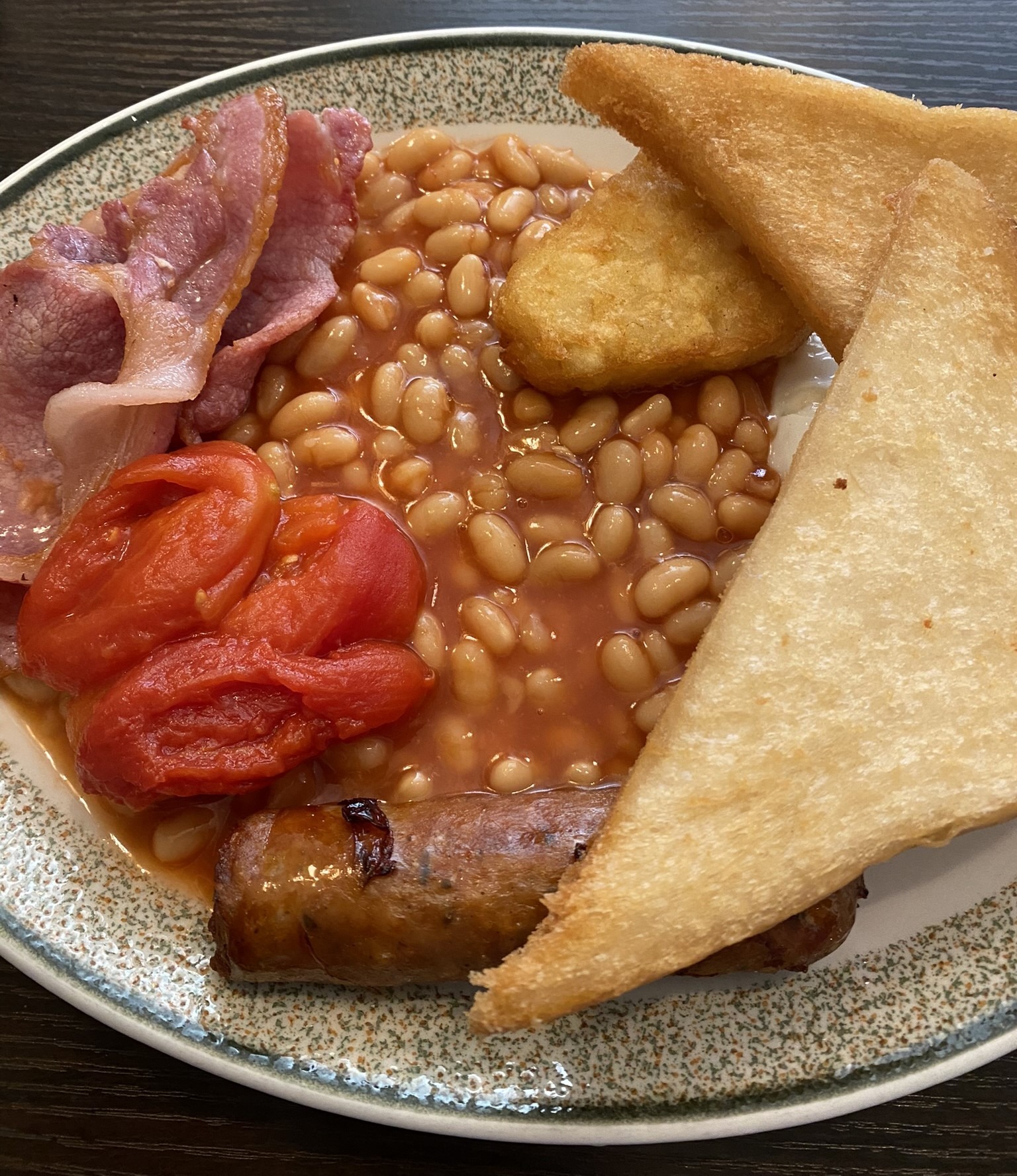
A note on vegetarian breakfasts – I regularly order a veggie version, particularly when quality and prevenance of bacon etc is unknown or suspect. Veggie sausages can be really good. I favour the “bubble and squeak in disguise” type rather than the faux-meat variety, but that’s just personal peccadillo. Often chefs are inspired to be a little more creative in replacing the pork products and this can mean something interesting like chickpea fritters or spiced marsala potatoes. Wilted spinach seems to appear with depressingly regularity and is almost always a mistake.
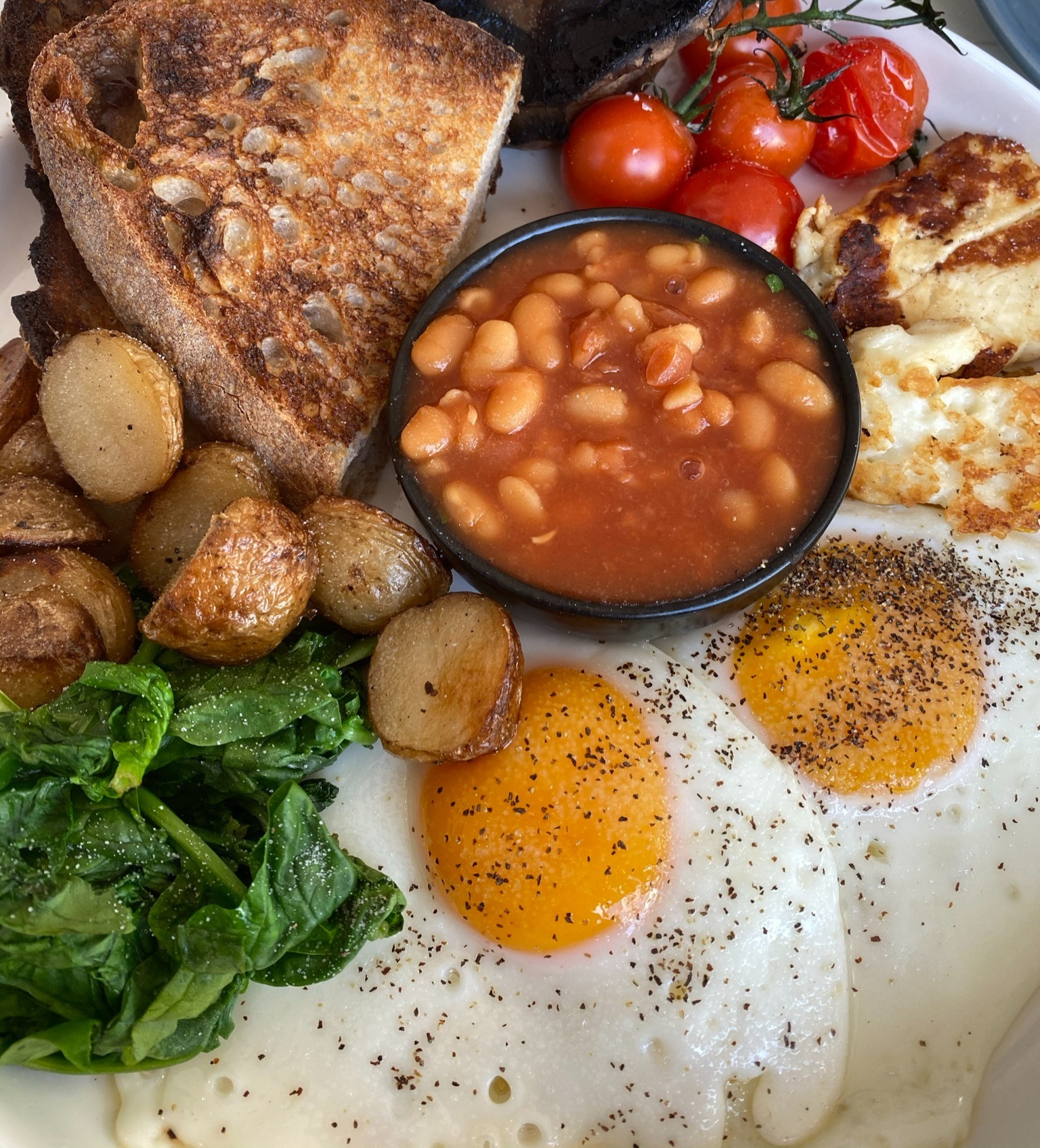
The controversial subject of breakfast baked beans is, like the weather, a matter of constant discussion, propaganda and violent hyperbole in Britain. I used to be “dead set against them” (a phrase I picked up in the transport cafes of Lancashire whilst researching Bury black pudding) but am now somewhat reconciled to their chalky legumity (a word which ought to exist but doesn’t). I tolerate but don’t relish them. On occasion they arrive in a small ramekin, confined to their own paddock at the side of the plate. In a way it’s a good idea – if only for the ease with which they can be ritually cast aside – but the mini-ceramic gentility of it all is so excruciating that it really can’t be countenanced. Worth noting that the “Full English” at both The Connaught and the late A A Gill's favourite The Wolseley includes baked beans, so let’s not be too quick in consigning the entire beany oeuvre to the gutter. If you are very lucky, you may come across homemade beans in your breakfast travels. Norman’s Cafe (see below) and the Bull Inn Totnes (see pic), for example, make their own. If you see them, clutch them to your (now bean-smeared) breast.
Talking of tomatoey sauce, there is also the vexed question of “red or brown” (not generally something debated at the Connaught). Do as I do and mix a little of each together into a fruitier, spicier and less aggressively vinegary melange. It side-steps the debate and is genuinely tastier as well. You could consider more outré condiments: I’ve successfully served walnut and rocket pesto with brekkie and glazed my bangers in marmalade and harissa (at the suggestion of Sarah Randell’s lovely Marmalade book). You might get odd looks requesting either in your local melamine-topped hostelry, however.
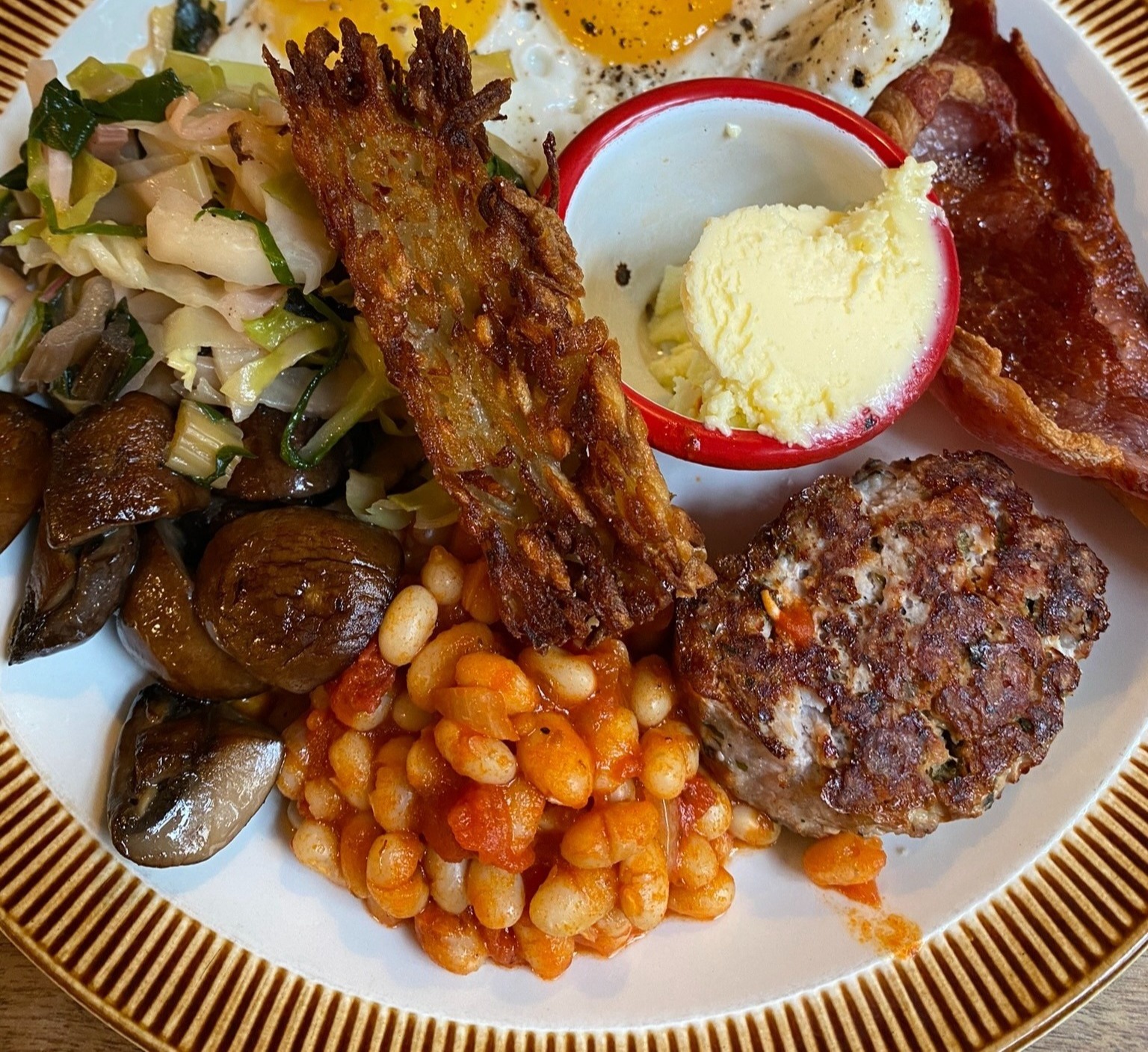
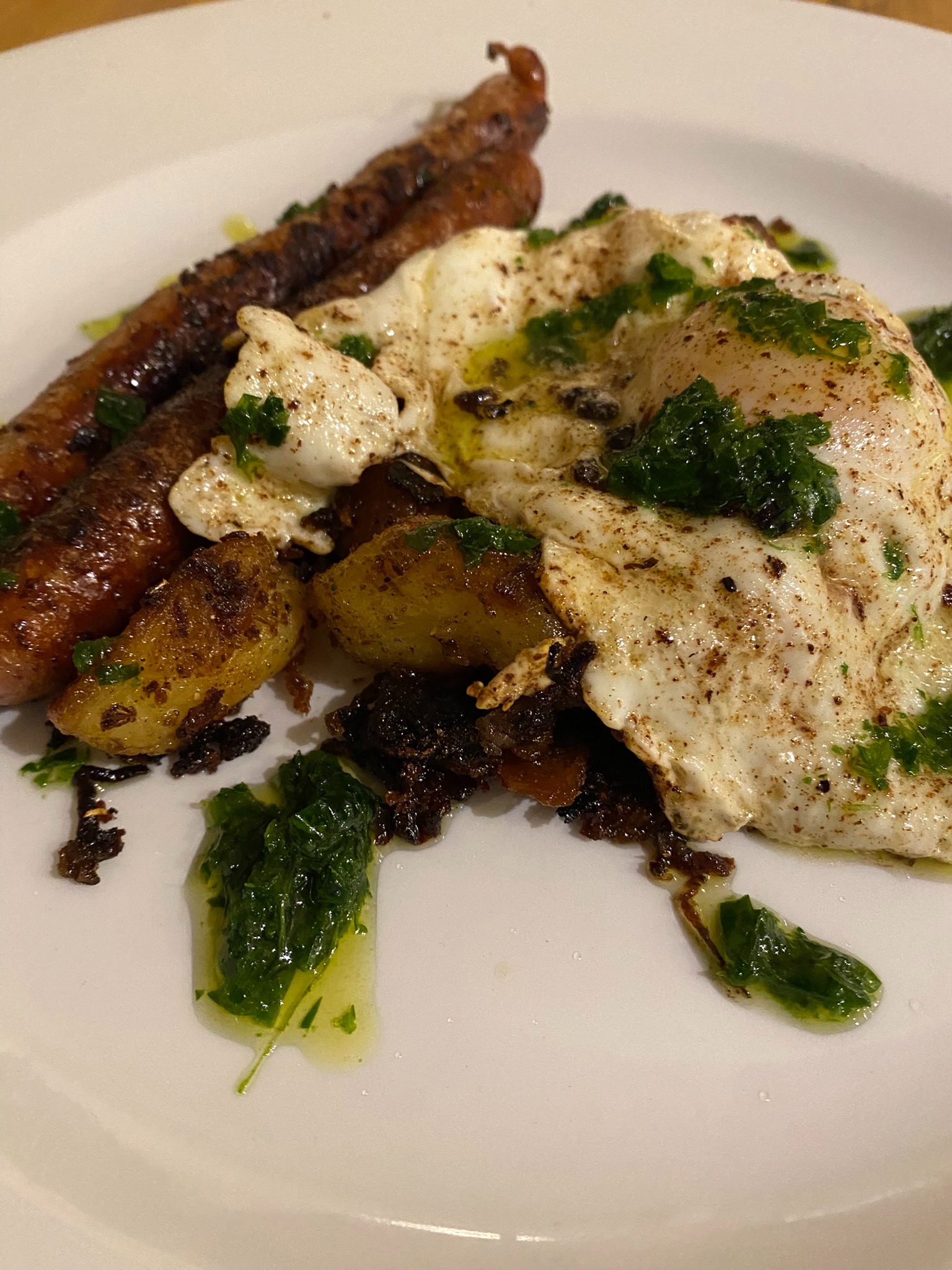
Bread is needed with all this protein and fat. Generously buttered toast is good (white not brown) and there’s always the lure of doorsteps of bread and butter to yolk dunk and plate mop. If you’re a character from a kitchen sink drama, that is: in the real world no one actually does either. The apogee of breakfast breadiness is fried bread – the “fried slice” of greasy spoon infamy. Cheap white bread is best; avoid sourdough at all costs as some arcane alchemy turns it to stone in the pan. My tip for success (and probably an early grave) is to lightly butter the second side. The first absorbs a lot of the oil leaving side two often scorched and barren (never a good look at breakfast). Buttering ensures second-side crispness and adds flavour to boot (oil alone can give something of a monotonal, axel-grease quality).
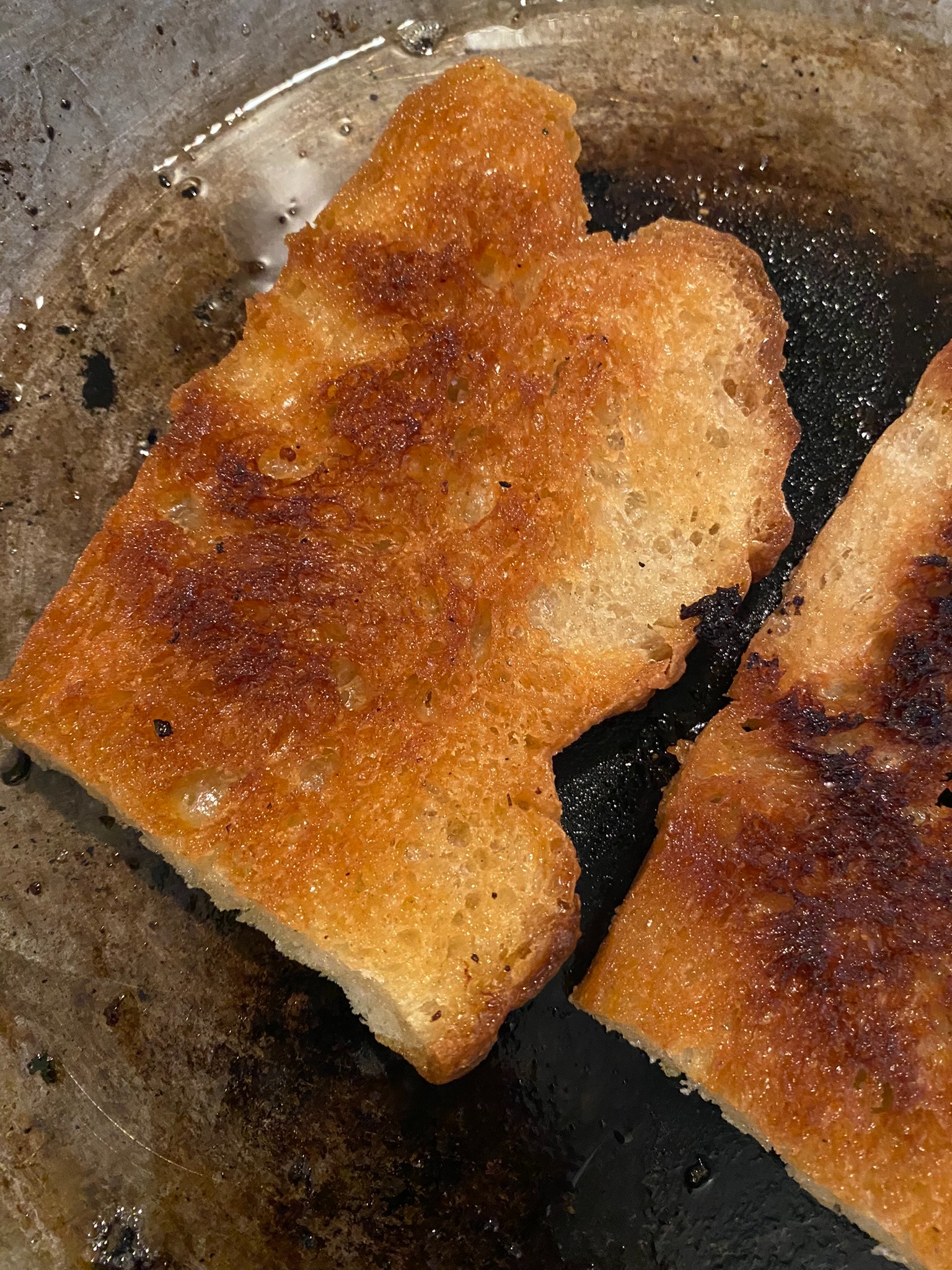
Potato products are a nice thought. I’ve fried leftover mash, aligot and pommes Anna all to rather nice effect. Sauté potatoes take on an unpleasant glassiness and a strangely stale demeanour if re-reheated and duchesse become terrible, dry shadows of their former selves. Bubble and squeak can be good, provided the brassicas aren’t too insistent, and Ireland’s boxty is great. The latke/hash brown family make the best choice. You don’t want to make these from scratch at home, and bought ones are awful, so make the most of them when out and about. NYC is their spiritual home where they are, in my experience, a revelation. Back on this side of the Atlantic, Scotland’s tattie scones and Ireland’s potato or soda farls run a close second – bread/potato hybrids, they are brilliant lightly gridled and oozing with unsalted butter.
My selection of London breakfasting (when you can't face making your own)
The Wolseley
Eating baked beans in the mittel-European splendour of this place still feels reassuringly iconoclastic. An institution.
Regency Cafe
Art-deco cafe (definitely no accent here, French anyway) selling greasy-spoon fare in Formica-topped splendour since the '40s.
Norman's Cafe
Instagram darlings who elevate pics of sausage, beans 'n chips to near-Warhol levels. Great greasy-spoon-inspired brekkies with “no changes”.
Fallow
They’ve just launched a new breakfast menu which, like their main affair, is a treat. Black pudding Benedict and croissant royales. Yes.
Dean Street Townhouse
The ever delightful townhouse on, unsurprisingly, Dean Street in Soho. Don’t miss the wonderful, if oddly square, Lorne sausages.
Honey & Co
Choose between Lamb's Conduit St. and the lovely Store St. branches both offering a fresh and different breakfast of Middle Eastern delights.
Some of my favourite specialist retailers
... unsystematic, unsponsored, unapologetic ...
Farmison & Co.
Delightful porky products and a lot more to drool over. Coming to you from North Yorkshire.

